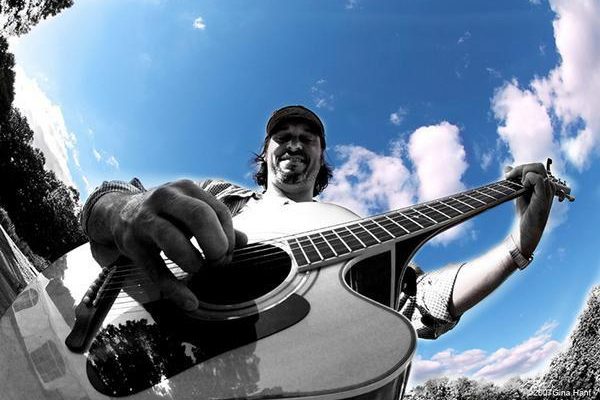The music of Pittsburgh-based songwriter Tom Breiding has taken him across the country and into the heart of the music industry machine, but over the course of a career that now spans 13 albums, the Wheeling native came to find his home writing songs from the heart about the people and places that matter most.
Breiding celebrates his latest album, River, Rails or Road, at a special album release show this Friday at 7:30 p.m. at The Blue Church in East Wheeling. Like much of his recent work, Breiding’s new batch of songs was inspired by a deep sense of place and the stories of people struggling for a better life. While his previous album, “The Unbroken Circle,” focused on West Virginia’s history of struggle in coal country, “River, Rails or Road” shines a light on the effects that industry has had on the region’s communities, particularly in coal towns that have been exploited and then treated as throwaway places.
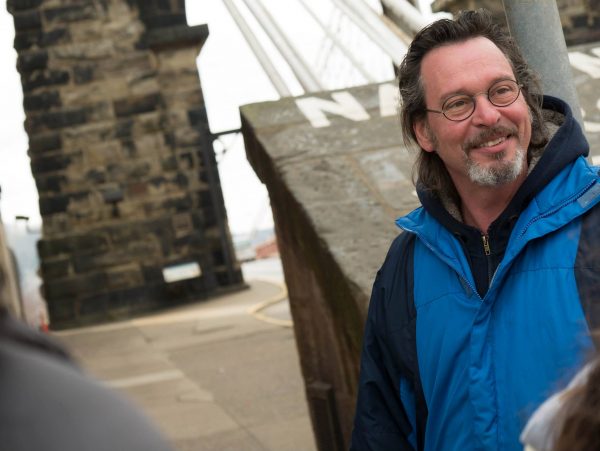
Many of the songs were directly inspired by the stories of people he has met through his work leading immersion trips for Wheeling Jesuit University’s Appalachian Institute and through his activism with the United Mine Workers of America’s Fairness at Patriot campaign, which has fought to retain health and retirement benefits for coal miners.
The album includes a DVD of “River, Rails or Road: Tom Breiding’s Wheeling,” a short film by Jeff Sewald about the Wheeling of Breiding’s childhood, the way it shaped his career, and its future possibility.
I spoke with Tom by phone about his career as a songwriter, the power of story-based songwriting, and the contributions that music can make to movements for change in Appalachia and beyond.
Iafrate: Tell us about your beginnings as a songwriter in Wheeling.
Breiding: I didn’t start writing seriously until I was in my early 20s. I was playing in a band [in Wheeling], and the guys that I played with wrote quite a few originals, and I just decided to start writing songs for the band so that I would have original songs to play. And their response was overwhelming. They just said the songs were really good. And then when I moved to the Pittsburgh area, I quit playing in bands for a very brief period of time — maybe a year or a little less. So I found myself for the first time without any real outlet, and that’s when I bought my first acoustic guitar.
I didn’t even own an acoustic guitar until I was 23, and I bought one just to start writing songs. I just wrote about anything and everything, and I just started to notice all these trends in my songs, the things I was writing about. Most of it dealt with growing up in Wheeling, a blue-collar town with blue-collar people. My settings were always on the loading dock or the beautiful places that we see in Wheeling with the hills and whatever. So that’s when I started to consciously write about things that I thought were important.
I grew up in a three-bedroom townhouse with six people in my family. I didn’t have the benefit of having people pay for my stuff, so I had to start working when I was 15. I worked where my father worked at a medical supply store for almost 10 for years before I graduated from college. And I worked countless night jobs, summer jobs, side jobs, whatever. I just worked and worked really hard. So I guess that work ethic was a natural thing for me to start writing about. You know, the common guy that works his ass off.
Iafrate: Where did you go to college, and where did that lead you?
Breiding: I went to West Liberty State College and West Virginia Northern. I took about 6 ½ years to graduate from college because I didn’t know what I was going to do. But ultimately what led me back to college was meeting my wife when I was 19. We started talking about what we were going to do as we grew older and how we were going to make things work, and a college education was the way to go. I had some good teachers when I was younger, so I figured I could do the same thing for some folks that teachers did for me, to help them make some good choices. They were just such an influence on my life.
Iafrate: Did you go into teaching for a time and gradually focus on your music later?
Breiding: I taught for 18 years, but music has never, ever been secondary. It has always been at the forefront of my daily life. It was always what I wanted to do, and still is today. But I grew up with that work ethic and the idea that you do what you have to do to pay the bills and to be successful. So I just pursued music at every opportunity that I could [while] supporting my family and myself, working day jobs and teaching or whatever.
Iafrate: You spent a period of your career as a contracted songwriter in Nashville.
Breiding: I didn’t live there, but I commuted. I would spend up to three weeks at a time in Nashville because I was a signed staff writer, and I was in contact with my publisher on a weekly basis. I was sending down maybe four or five songs a month. And because it was such an exciting opportunity, the folks at the Catholic school where I worked were really helpful in trying to give me time to dedicate to my writing career. So I was able to take personal days and sick days to go down there. Every holiday we had according to the school schedule, any extended breaks at all, I would go to Nashville and spend my time there. And summers, of course, I would go down for two or three weeks, come back, and then go back for three weeks. That type of thing.
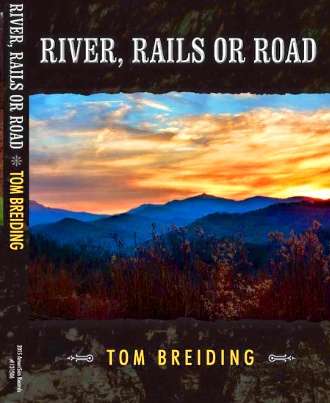
Iafrate: It must have been an exciting experience to be connected to that industry, but then you ended up shifting gears as a songwriter.
Breiding: It was the absolute, most incredible experience of my life. Going into work and seeing stars like Ronnie Millsap, Bob Welch, and all these people. I couldn’t even begin to name all the names, but hugely successful people in the industry. They were in the office almost on a daily basis, and I would sometimes have lunch with them. I was invited to do different writer nights with people. It was just like living the dream. That’s a phrase that’s used way too often by a lot of people. But this truly was living the dream. But the thing is, you need to get the cut. That’s the first time that someone else records your songs. And I never got that cut. I would write songs that I thought could be cut by other artists, and no one wanted to hear them. But they would ask me to play “Steeltown Blues” or “A Picture of Him,” songs from before I got signed, and they loved them. They didn’t see them as marketable, but they loved them.
And I realized very early on that if I was going to write good music, it was going to have to be what comes naturally, what comes from the heart and not written for any certain type of audience. I’m always asking myself whether I reverted back to the type of writing that comes naturally because I wasn’t able to write any successful commercial songs. Instead, what I like to think is that the best songs I write are not for any kind of commercial purpose, and that they are really good enough to stand on their own and be memorable.
Iafrate: So when you came back to that style of writing, it seems that hearing the stories of people and communicating those became really central to your songwriting.
How does hearing people’s stories work for you as a songwriter?
Breiding: It doesn’t sound like there’s a lot of humility in this, but if I have something I really wanted to say, I could write a decent song every day of the week. Every time I pick up the guitar, I come up with three or four pieces of music that I know will work as a framework as a decent song. It’s just a matter of whether I finish it. So when I meet people whose stories really touch me, then that writing comes pretty quickly. The best example is the Fairness at Patriot fight. I was inspired to write “River, Rails or Road” by my travels with Julia [Flint], who wrote the liner notes in the record. She had the [Immersion Trips Coordinator] position at Wheeling Jesuit University before I did.
That month was such an inspiring, moving month, meeting all these folks. So I wrote that song probably within a day or two after our last trip. And then when I sent [my son] off to college, I was just so moved by him moving out of the house, I struggled with it for the weekend. I woke up on Monday morning, and I wrote “Angels We Let Go” in about 20 minutes. It’s just something I had to say. So with the Fairness at Patriot thing, it was the same way. I wrote “River, Rails, or Road” and that brought me to the campaign, just to go and perform that song, and I reworked an older song to sing at the rally. Then I got there, and I met these people, and I learned about their plight and how they were being robbed. I talked to them and got their individual stories, and I got home and wrote probably half a dozen songs within a week. Three of them, I think, are on “River, Rails or Road.”
So I have to be compelled, I guess, to write. And I’m compelled by things I feel like I really need to say.
Iafrate: And people’s stories compel you to say something.
Breiding: Yes, they absolutely do. When I got involved with the campaign, part of it wasn’t completely selfless. I was excited to share my music for some big crowds. And I like to travel anyway, to go to St. Louis and play at these rallies. But after I met these people, I talked to as many as I could. I wanted to find out from each individual, so what’s the deal? What’s this mean to you, losing your pensions and benefits, and how hard did you have to work for those? You just hear these incredible stories. And I was totally inspired to write.
Iafrate: One of the songs that struck me on the album is “This Land is Home to Me,” which is named after a social justice statement from the Roman Catholic bishops of the Appalachian region in 1975. Can you say more about how that song came about?
Breiding: My work at the (Wheeling Jesuit) Appalachian Institute is really moving. When I’m meeting all the students week after week after week and traveling with them, I get really inspired. So I was just on my way back to the office, and it was one of those weeks that was a real reflective time for me. I was like, wow, this is a really amazing opportunity I have been given, and I just thought about [the document] “This Land is Home to Me.” It’s kind of like our Bible at the Institute.
When I got there, they gave it to me and said, “If you work at the Institute, you have to read this.” And I hadn’t before. So I was just thinking about that, and when I got to work, I went straight into my office and just sat down and started writing my own “This Land Home to Me,” particularly as it pertained to my hometown of Wheeling. That was another part of the inspiration. That was back when they were tearing down most of the heart of what used to be the retail business in Wheeling on Market Street, the old G.C. Murphy.
That floored me, just seeing those buildings go down. I just never thought I’d see it. So that’s another one. I just wrote it in probably less than an hour.
Iafrate: In your songs we hear not just the stories of people but their context. We are hearing the stories of people but also the stories of places.
Breiding: Well, when you talk about places you’re talking about people, particularly in Appalachia.
You’ve heard this a hundred times, and you’re completely aware of it, but I don’t know if you younger people really saw—I saw the tail end of these people that really were still building America. Now you see the people who fuel America, the coal miners and what not. There’s something just incredibly noble about that, you know? Because of the unions they were compensated well; these people that kept our country going, helped to win our wars, and build the infrastructure and work ethic and strengthen the unions that help the middle class. And they were self-sustaining. And I guess when you see it all disappear almost overnight—all of a sudden nobody’s working. All of a sudden, nothing is happening. All of a sudden, things are closing down. And every day somebody you know is leaving town.
When you see that, it’s just something you never forget. You took for granted that you come from the greatest place in America. We do all the hard work here, we are the salt of the earth and we are doing a great service for our country. We love it here, and we love doing this. And then all of a sudden everything is gone. And so in the last verse of “This Land is Home to Me,” you hear, “Okay, you are leaving, but at least leave us with clean water and leave us with some decent living conditions.” That’s really the essence of the last verse.
Iafrate: The stories you tell in your songs include not just miners and other workers, but the story of the land and the environment, and those two things are often in tension with each other. How do you work through that tension as a songwriter and as a person?
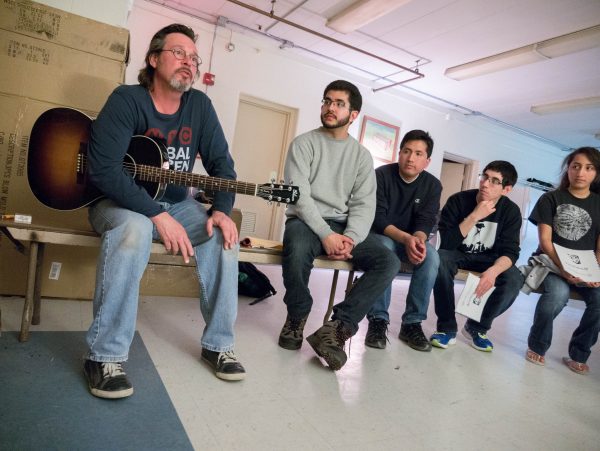
Breiding: Like a lot of things in my personal life, or in anybody’s personal life, you never completely get a grasp of reconciling one thing and another. I go where my heart tells me to go. You know, it’s pouring down rain here today. I hate to use a cliché, but I kind of walk through the raindrops, in between the environmentalist people that I love dearly, people that I work with that are so passionate about it. And then my background is so much more blue-collar. Aside from the ecology idea of the early ’70s that I grew up with and the early days of Earth Day—I mean, we celebrated those things. I guess my own environmentalism comes from growing up in West Virginia, where I spent all of my time in the woods and at the river fishing.
I never did hunt, but as kids we played in the woods. Even into my late teens, we were much more prone to just go out to Wheeling Creek and just hang out as opposed to running around to bars or the ice-skating rink or whatever was going on. So I have both sides that are a big part of me. I don’t know if I will ever be able to reconcile both. It’s something that I get very uncomfortable with at times, especially when my music comes to the forefront as it is right now with the new record release. I have talked to colleagues about this before, and at home with my wife it’s an ongoing discussion that we have between the two.
As far as being an artist, one of the most important records that I discovered is called “Pete Remembers Woody.” It’s just a two-CD interview with Pete Seeger embellished with music. He talks about all of his travels with Woody and the decisions that they made. It’s easy to look at somebody like Pete Seeger and say, oh, he was such an environmentalist. Well, it wasn’t always that way. There was a very commercial side to him where they strictly wanted to break into the charts and the mainstream. And before (his environmentalism) it was labor, and before that it was the business of war. So their ideologies on all of these things were shaped by what they thought was right at the time and how they could do the most good in whatever area they saw was important to people at the time. So I have gone back and listened to that at least half a dozen times, and I use that as my compass. So I have to balance this, and the only way to balance it is that it just has to be real for me. It just has to be what I believe. I think it’s hard to reconcile them. I can’t completely.
Iafrate: I think it’s powerful that you raise them both up, not necessarily having an answer or trying to resolve them, but pointing to something that we need to pay attention to.
Breiding: There is a human cost for everything that happens, and I can never, ever forget the human cost. Even considering how passionate I am about the environment and the beauty of God’s creation, I still lean toward the human cost. I don’t want to be responsible for one person losing a job. Honest to God, that is truly in the back of my mind no matter what I do. I’ve seen the importance of jobs.
When you live through that and watch it disappear, it’s brutal. You really don’t forget it. You don’t forget the families that you knew who are all of a sudden on food stamps. That’s the question I always ask myself. It’s a troubling question. It cuts right to the heart of it, and that’s really where I am with it. It’s honesty. It’s where I am. That helps to answer the question of how I can write “This Land is Home to Me” and then write something like “Footprints in the Coal Dust.”
I can write both of those because they both are very real and true to me, but if you look at the two songs, they look like they’re on opposing sides of the spectrum.
Iafrate: With your involvement in the UMWA Fairness at Patriot campaign, you have not only been a songwriter but an activist. How do you see music and activism fitting together?
Breiding: First of all, the word activist always scares the hell out of me. I’ve always been a pacifist [laughs]. And I know there are pacisfists who are also activists, and I have always been outgoing and outspoken, but I have a side to me that’s very passive. I have this thing where I don’t like to be in the middle of any conflict or confrontation. So I had never, ever really considered myself an activist, and up until the Fairness at Patriot campaign I have been reluctant to be an activist for almost anything.
But as I said, once I talked to those people, and I knew what was going on, it just pissed me off so much that I thought, well, if I’m going to get active about anything, I’m going to be backing this. But I still don’t feel comfortable. I think activism comes very naturally to some people and it doesn’t for me. I prefer to connect with people on a one-to-one, personal basis, and that’s always how my music has been. When I’m talking to people and hearing their stories, I’ve always considered myself very open-minded and understanding, and there is very little room for that when you’re active in a cause like the Fairness at Patriot campaign which is black and white.
I guess that’s why it’s so much easier for me to be active and play a role as an activist (in that campaign) because I just saw it as black and white. There is no neutral ground on this issue.
Iafrate: Are you kind of a reluctant activist, then?
Breiding: Well, not with the Fairness at Patriot campaign. Mountaintop removal too. There’s absolutely no positive side whatsoever [on those issues]. There is none. I see it is black and white. There’s right and there’s wrong, and this is wrong. And it’s easier for me to be an activist like that. The problem comes when there’s a little bit of gray area. How many people are going to be affected by this? Is the community really going to be better off, or is it going to hurt the community? That’s where I get nervous, and my natural reaction is to kind of try and stay in the middle and just kind of see where things go.
Iafrate: Have you seen music make a positive change in communities in your career?
Breiding: I have seen very little of it in my own community here in this region. If you look globally and nationally in the historic sense of things, with folk music of the 1960s, music was instrumental to changing ideas and ways of thinking. But that’s because it was brought to the forefront where it was available to everybody. But I just haven’t seen music make a difference in any way at this point in this region. But my exposure to (music making change) was when I first started attending Northeast Regional Folk Alliance conventions back in 2008. And then it was like all of a sudden these people were doing really important things in their communities through music.
But that’s New York, the Hudson River Valley, and it’s a much different thing. So I would travel up there, and I guess that’s why I was so intrigued because I had never really seen it happen here in my region ever. You know, Wheeling has been the toughest town to play in as long as I can remember. And yet that’s what I was fortunate enough to witness with the mineworkers. You’re never going to find any community that is more blue-collar, or macho if you will, than that. And they just embraced my music because of the union and that solidarity that involves hundreds and hundreds of people, and music is really embraced in that context. I’m really glad I get to experience it.
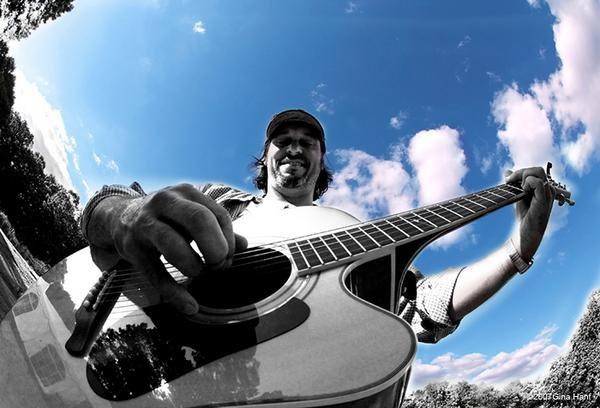
Iafrate: What are your hopes for the future of Wheeling, in terms of industry but also things like the arts and music? Do you have a hopeful vision of your hometown’s future? And why did you choose The Blue Church for your album release?
Breiding: Yes, I absolutely do. I have a hopeful vision of Wheeling with the arts, in particular, and in the ideas that we spoke about like sustainability and young entrepreneurs and business. For the first time in many years, I see hope. Just the other night I was talking to one of my dearest friends who lives in Wheeling. I talked to him on the phone, and he said, “Tom, things are really changing. We are coming out to The Blue Church on Friday.” It used to be that nobody had anywhere to go, that there was nothing to do.
He said he sees things changing. People want to go out, and they want to listen to music and they want to go to the brewery and they want to do this and that. And it’s all because of the young people who have brought those opportunities for cool things to happen. That changes the whole attitude of the community. And I really see great things happening. With my job, I have been lucky enough to be exposed to a lot of people that are behind this resurgence and a lot of people who are making great decisions and choices to invest in Wheeling.
And so The Blue Church, that was a no-brainer for me, really. I mean, where else would I do it? I’m really glad to be doing it there.
Friday’s performance at The Blue Church will include a solo acoustic set from Breiding, the premiere of the River, Rails or Road film, and a full-band performance from Breiding and his band, American Son. The CD/DVD set will be available for purchase at a special rate of $10. The Blue Church is located at 1206 Byron Street. Tickets are available for $8 in advance or $10 at the door.
(Photos supplied by Tom Breiding)


